Edie Melson's Blog, page 225
September 21, 2019
Less Burden—More Joy
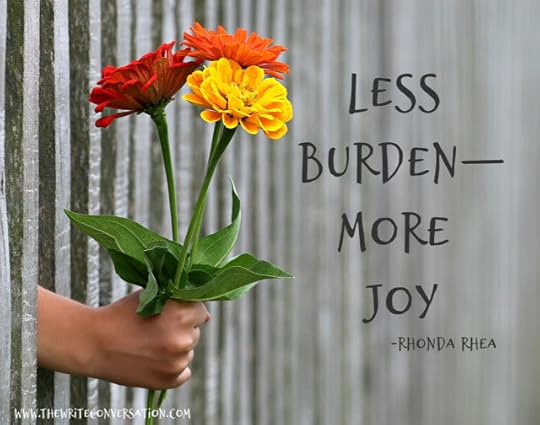
by Rhonda Rhea @RhondaRhea
Coffee and donuts. They go together like love and marriage. Someday I’d like to write a poem and I’d like to start it with the line, “Coffee and donuts, sittin’ in a tree.” I’m not sure where to go from there. I get that far and all I know is that I want to be in that tree.
I confess I’ve had a few too many donuts. Sad to say, the bough on that tree would be bending pretty low about now. That’s why I decided to go on yet another diet recently. Also sad to say, I’ve already fallen off the wagon.
You know, if someone would think of bringing fudge along on the wagon ride I would be a lot more motivated to stay on it. Okay, I suppose a really good friend would probably give me a nudge to stay on the wagon. Nudge or fudge. Tough call on which is best, friendship-wise.
In our spiritual lives, we all need a little nudge now and then too. It’s good to have people in our lives we can count on to nudge us in the right direction, wherever the wagons are heading.
As pioneers were settling the west, when they were threatened by an enemy, circling the wagons was part of their defense strategy. The circle provided a protected cover they could get behind to fire at their attackers.
We need to rally with those on this life’s journey in the same way. We have a common enemy. Peter reminds us to “be alert” because our “enemy the devil prowls around like a roaring lion looking for someone to devour” (1 Peter 5:8 NIV). Circle the wagons! Our church family is part of our defensive plan against our enemy. The next verse in 1 Peter says, “Resist him, standing firm in the faith, because you know that the family of believers throughout the world is undergoing the same kind of sufferings” (vs. 9).
We’re in this together. Let’s not neglect circling the wagons. “Not forsaking or neglecting to assemble together as believers, as is the habit of some people, but admonishing (warning, urging, and encouraging) one another, and all the more faithfully as you see the day approaching” (Hebrews 10:25, AMP).
I’m so thankful the Lord has placed godly church buds and godly leaders in my path all through my life via the church. People with just the right nudge at the ready. There are pastors, teachers and leaders who stay alert to our spiritual supervision, keeping watch the scripture says. And Hebrews 13:17 instructs us to be responsive to them. “Have confidence in your leaders and submit to their authority, because they keep watch over you as those who must give an account. Do this so that their work will be a joy, not a burden, for that would be of no benefit to you.”
Less burden. More joy. It’s a good choice.
And in other choices, I’m considering choosing to keep the extra 20 pounds and just get myself a bigger wagon. One with really good shocks.
TWEETABLE
Less Burden—More Joy - insight from @RhondaRhea on @EdieMelson (Click to Tweet)
 Rhonda Rhea is a humor columnist for lots of great magazines, including HomeLife, Leading Hearts, The Pathway and more. She is the author of 10 nonfiction books, including How Many Lightbulbs Does It Take to Change a Person? and coauthors fiction with her daughter, Kaley Faith Rhea. She and her daughters host the TV show, That’s My Mom, for Christian Television Network’s KNLJ. Rhonda enjoys traveling the country speaking at all kinds of conferences and events. She and her pastor/hubs have five grown children and live in the St. Louis area.
Rhonda Rhea is a humor columnist for lots of great magazines, including HomeLife, Leading Hearts, The Pathway and more. She is the author of 10 nonfiction books, including How Many Lightbulbs Does It Take to Change a Person? and coauthors fiction with her daughter, Kaley Faith Rhea. She and her daughters host the TV show, That’s My Mom, for Christian Television Network’s KNLJ. Rhonda enjoys traveling the country speaking at all kinds of conferences and events. She and her pastor/hubs have five grown children and live in the St. Louis area.
Published on September 21, 2019 22:00
September 20, 2019
Music – Words to the Soul

by Emme Gannon @GannonEmme
“Music gives a soul to the universe, wings to the mind, flight to the imagination and life to everything.” Plato
Plato’s words become especially real to me on Saturday morning. It’s my time of reckoning (with myself) after a busy week of trying to hold life together. Good days and bad have bounced back and forth like a volley ball. Then Saturday. Pulling myself away from a normal healthy breakfast, I indulge in a stack of pancakes smothered in real butter and maple syrup, two pieces of bacon, and a pot of green tea. All the while allowing soft mellow music to coax away any grey emotions that have clouded my soul, obscuring God’s presence and purpose in my life. Researchers tell us that music has the ability to increase creativity and ideals. As writers, music can be fuel to our words. Where words fail, music speaks, extracting emotions and reflections through harmonic frequencies, whispering thoughts to our senses as we write.
As music draws out words for the writer, it also expands the experience of film. In the film version of C.S. Lewis’s The Lion Witch and the Wardrobe, we witness Aslan, offering himself as a sacrifice for Edmund’s sin. We watch him being tied to the stone alter, somber music intensifying, digging deep into our hearts, linking us with pain and sorrow as we watch his abuse, and then the final stone knife thrust into Aslan by the evil witch. As morning dawns, we hear the stone altar crack and see Aslan alive. Victorious. Having risen from the dead, the price of sin fully paid, while the resounding music crescendos, announcing his victory. Wefeelthe elation, thus exposing something of ourselves to ourselves.
Good writing has the potential to awaken that same emotion, but I contend that writing alongside good music intensifies the ability to rip the mask off the writer, burrow truth into our soul, and extract the words that need to be said. Words that breach the armor of even the hardest of hearts.
When listening to music we like, we experience less anxiety and lower cortisol levels than those who take anti-anxiety drugs. The brain releases the neurotransmitter dopamine, which makes us feel good and reduces anxiety. Thus, music has the power to improve mood which, in turn, can improve our ability to concentrate and capture thoughts . By emptying ourselves of negative emotions, we can focus more clearly on the moment, the message, the experience of creating story.
Not all music is created equal. The music must have a strong emotional impact and not be perverted by the world’s grinding negativity. Music with lyrics reduces our mental performance, while instrumentals boasts creativity. The more voices we hear while working, as in lyrics, the lower our productivity. Good music makes repetitive tasks more pleasurable and helps us be more centered on the task at hand. Certain regions of our brain that evokes emotion and concentration are more active when we listen to music.
My favorites to write by includes film scores from Schindler’s List, The Lion, Witch and the Wardrobe, Out of Africa, Chopin’s Symphony in E Minor from the film version of The Secret Garden, Yo Yo Ma Plays Ennio Morricone, and the film score from The Hours.
Good music is worship, the soft symphonic sounds permeating deep into our psyche, detoxing and filling us with peace. It is from this place that good writing happens. From a soul that has been on the dark side but is free and able to reflect on our terrible awfulfrom a point of overcomer thus pointing a way out to others. Music creates thoughts from deep in our soul—drawing them out onto the page—into the hearts of our readers. Creating story—pulled from memories of who we are and what we believe. Inspired by music.
TWEETABLE
Music, Words to the Soul - inspiration from @GannonEmme on @EdieMelson (Click to Tweet)
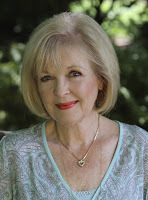 Emme Gannon is a wife, mother, and grandmother who loves to write stories that stir the heart. Her award-winning writing has appeared in Focus on the Family magazine, several anthologies, and numerous newsletters. She just completed her first novel.
Emme Gannon is a wife, mother, and grandmother who loves to write stories that stir the heart. Her award-winning writing has appeared in Focus on the Family magazine, several anthologies, and numerous newsletters. She just completed her first novel.
Published on September 20, 2019 22:00
September 19, 2019
A book Launch & a New Facebook Live Study
 by Edie Melson @EdieMelson
by Edie Melson @EdieMelsonMany of you have heard that I have a new book coming out. It's my first experience collaborating with another author and it's been so much fun! The book is unRuffled, Thriving in Chaos . I had the honor and pleasure of writing it with the amazing Rhonda Rhea for Bold Vision Books.
Unfortunately, it's not available for preorder. All the buy links will go live on book launch day —next Tuesday—September 24, 2019.
But we have lots of fun stuff planned that day—in my private Soulful Ink Facebook Group.
Rhonda and I will be teaching a 5-week FB live study focused on facing the upcoming holiday season unruffled and unflappable.
I'm sure you're like me and have heaved a big sigh of relief when all the holiday decorations are stowed away—only to think of all the things you wish you'd done during that joyous season. Well this year, join us as we get ready to make things different. We're going to go into the holiday season prepared and carrying God's peace inside of us.

So hustle on over to Facebook and request to join the Soulful Ink private Facebook Group so you can take part in this free study!
TWEETABLES
A Book Launch & a New FB Live Study - UnRuffled Holiday Soul Care - @RhondaRhea & @EdieMelson (Click to Tweet)
Get ready to face the upcoming holiday season UNRUFFLED - with @RhondaRhea & @EdieMelson (Click to Tweet)
Published on September 19, 2019 22:00
September 18, 2019
Rest for the Writer’s Soul

by Susan U. Neal RN, MBA, MHS @SusanNealYoga
As conference season winds down, I am exhausted. Do you feel the same way? It’s hard to generate creative ideas, write excellent prose, and meet deadlines when worn out. How do we recuperate? Through rest. There are many different ways to rest.We are multidimensional beings with a physical body, perplexing emotions, intellectual mind, and longing soul. It is vital to plan various types of rest in our busy schedules. In the blog, Prevent Post-Writing-Conference Burnout, I briefly discussed rest and soul care for the writer. Today we will dive deeper.
After creating the world, God rested on the seventh day. He also told us to rest one day a week—to benefit us. He knew we needed a break. Sunday provides the perfect opportunity to relax physically and emotionally while enhancing our spiritual life.
Physically we need to stop working and relax. Each week plan to rest your body, physically. Sit outside on your patio and watch the sunset. Lounge by a pool, lake, or beach. Lie on the couch and watch a funny movie. When we laugh, positive mood-enhancing endorphins release in the brain. It is amazing how God created our bodies to recover if we only slow down and rest.
Emotionally we can rest through healthy relationships. Family vacations, date nights, or lunch with a friend fill emotional needs. Promote family relations at dinner time. During my vacation in France, I embraced the French culture of dining for two hours. You could serve appetizers at 20-minute intervals (such as a melon and then a salad) before the main entrée. Time at the table allows a family to sit together and talk. In America, we may spend an hour cooking and eat our meal in twenty minutes. Spending family time together restores the emotional part of our soul.
Did you take a vacation this summer? Mine was physically active, but I stopped working entirely for two weeks, so my mind had a chance to rest. I took long hikes in nature. God’s creation restores our creative talents. When we give our brain a break, it recovers.
Spiritually we need to rest with God. I like to spend fifteen minutes of meditative time with the Lord, and then do a devotion.Soul Care for Writers by Edie Melson is my favorite devotional, right now. Today I completed a Creative Connection page that asked, “Why do you like being a writer?” and “Talk to God, thanking him for the gift of writing in your life.” I filled the page, and my heart overflowed with gratitude to the Lord. This fall, Edie is beginning a new Soul Care Facebook Live Study. Are you planning to participate? Our souls need nourishment too.
In the morning, I like to stretch for twenty minutes before I write. It is beneficial to take short, physically active breaks while you work. Tips to Stay Physically Active When Writing provides great ideas like doing squats or lunges right after each bathroom break. If you take care of yourself, your productivity increases.
In the evening, before going to bed, it is not restful to be on social media. We may be resting physically but not emotionally or intellectually. Being on the phone right before bedtime, engages the mind making it difficult to wind down and sleep. It is best to turn your phone off at night and place it away from your bed. In fact, no electronics should be close to your bed. Reading is much more restful for the mind and prepares you for sleep.
When we rest, restoration takes place, and we become renewed. Motivation, along with new ideas, flourish once again. Schedule little blocks of time for self-care. Get your calendar out and schedule time for you!
TWEETABLES
Rest for the Writer's Soul - @SusanNealYoga on @EdieMelson (Click to Tweet)
Rest can lead to writing motivation and new ideas - insight from @SusanNealYoga on @EdieMelson (Click to Tweet)
 Susan U. Neal, RN, MBA, MHSSusan’s mission is to improve the health of the body of Christ. She has her RN and MBA degrees, as well as a master’s in health science. She is a CERTIFIED HEALTH AND WELLNESS COACH with the American Association of Christian Counselors. She published five books, the Selah award winner
7 STEPS TO GET OFF SUGAR AND CARBOHYDRATES
,
CHRISTIAN STUDY GUIDE FOR 7 STEPS TO GET OFF SUGAR AND CARBOHYDRATES
, HEALTHY LIVING JOURNAL, SCRIPTURE YOGA a #1 Amazon best-selling yoga book, and
YOGA FOR BEGINNERS
which ranked #3. She published two sets of Christian Yoga Card Decks and two Christian Yoga DVDs that are available at CHRISTINAYOGA.COM. Her digital product
HOW TO PREVENT, IMPROVE, AND REVERSE ALZHEIMER’S AND DEMENTIA
is a great resource. To learn more about Susan visit her website SUSANUNEAL.COM You can also connect with Susan on FACEBOOK, TWITTER, and INSTAGRAM.
Susan U. Neal, RN, MBA, MHSSusan’s mission is to improve the health of the body of Christ. She has her RN and MBA degrees, as well as a master’s in health science. She is a CERTIFIED HEALTH AND WELLNESS COACH with the American Association of Christian Counselors. She published five books, the Selah award winner
7 STEPS TO GET OFF SUGAR AND CARBOHYDRATES
,
CHRISTIAN STUDY GUIDE FOR 7 STEPS TO GET OFF SUGAR AND CARBOHYDRATES
, HEALTHY LIVING JOURNAL, SCRIPTURE YOGA a #1 Amazon best-selling yoga book, and
YOGA FOR BEGINNERS
which ranked #3. She published two sets of Christian Yoga Card Decks and two Christian Yoga DVDs that are available at CHRISTINAYOGA.COM. Her digital product
HOW TO PREVENT, IMPROVE, AND REVERSE ALZHEIMER’S AND DEMENTIA
is a great resource. To learn more about Susan visit her website SUSANUNEAL.COM You can also connect with Susan on FACEBOOK, TWITTER, and INSTAGRAM.
Published on September 18, 2019 22:00
September 17, 2019
How to Write with an Attitude of PRAYER

by Katy Kauffman @KatyKauffman28
Our Father God is faithful to hear the prayers of His children. And His writers. Just as God answers prayers about health, income, life’s trials, and daily surprises, He hears the prayers of those who seek to encourage others through the written word.Do you need some “punch” and pizzazz in your wording? Do you need perseverance to finish a book or create a book proposal? Do you need some help to know how to edit what you’ve written? Do you want people’s hearts and minds to be touched forever by your writing? One of the keys to effective writing, and an effective ministry through our words, is P-R-A-Y-E-R.
Make Prayer a Priority
P – Partner with God as you write.Our most powerful resource in writing is God Himself. He who wrote sixty-six life-changing books, preserved as His holy Word, can enable us to share our messages of hope and truth through the mediums of fiction and nonfiction. With God’s help and guidance, we can share His masterful themes of restoration, victory, and hope.
God knows what our specific audience needs to hear and how best to reach them. When you sit down to write, ask God to infuse His wisdom and creativity into your writing. When I’ve done that, the end result is so much better than what I could have engineered on my own.
R – Reorient your focus from deadlines to “wow.”When we’re pressured to make a deadline, our writing can lose some of its wow factor. Prayer centers our minds and hearts on God and reminds us of what matters the most—our purpose for writing, our audience’s felt need, and God’s input into what we’re saying. Still your mind and heart before Him when a busy schedule is stealing some of your creativity, and seek His help to write a captivating message to your audience.
A – Apply your message to yourself first.Just as preachers and teachers are called to live what they speak, writers are called to live what they write. That’s how we know that what we’re saying works—we have lived what we’re writing about. One of the best tools for coming up with good material and relevant application to our readers, is to keep a spiritual journal. In the good times, we can record what God is doing and the opportunities He’s giving us to share the truth with others. In the storms of life, we can record how God is there for us and the lessons He’s teaching us. Both sets of circumstances not only become the framework of learning how life with God works, but they influence our writing because we write about those things we know.
Y – Yield to the Holy Spirit’s leading.Have you ever been stumped with how to begin a blog post or chapter, and then out of the blue the first line comes to mind? I can’t count how many times that has happened to me, and my reaction is always gratitude.
Maintain a spirit of prayer as you write, and let your mind be directed by the Holy Spirit. But remember that writing isn’t 100 percent God’s job. It’s a wonderful, exciting, joy-giving partnership with Him, one that requires a lot of work on our part and helpful guidance on His.
E – Engage prayer partners in your writing ministry.We’re stronger when we work together. A threefold cord forms when God calls someone to write, and that someone calls on a friend to pray. Allow your friends to reap a blessing by asking them to pray for your writing. God will bless them for their faithfulness to pray on your behalf, and they will also reap joy in seeing people’s lives changed by your words.
R – React to obstacles with faith and graceIn the course of writing two Bible studies, editing four compilations, and designing numerous magazine issues, I’ve found that something tends to go wrong. The computer dies. The printer runs out of ink right before the deadline. A storm threatens to knock out the power. The book needs a whole new element added. Some edits weren’t added as I had thought. Something happens.
When we abide in an attitude of prayer, we can handle each obstacle, trusting God that He will help us to finish our project and that we will receive from Him the grace to do it. Instead of problems becoming a brick wall, they are only a hurdle to jump. And jump and jump. Writing conditions us to become relay runners, jumping hurdles and passing along the truth we’ve been given. Don’t stop short of your finish line.
Do you write with an attitude of prayer? What are some things we can ask God for ourselves and each other as we write? Tell us in the comments below, and keep writing and keep praying!
TWEETABLESHow to Write with an Attitude of PRAYER - @KatyKauffman28 on @EdieMelson (Click to Tweet)
Tips to make prayer a priority when you write - @KatyKauffman28 on @EdieMelson (Click to Tweet)
 Katy Kauffman believes in the power of prayer and the One who answers it. She is an award-winning author, an editor of
Refresh Bible Study Magazine
, and a co-founder of Lighthouse Bible Studies. She loves connecting with writers and working alongside them in compilations. Her compilation, Heart Renovation: A Construction Guide to Godly Character, was a 2019 Selah Awards finalist and Director’s Choice finalist. Katy’s writing can be found at CBN.com, thoughts-about-God.com, the Arise Dailyblog, PursueMagazine.net, and two blogs on writing. She loves spending time with family and friends, making jewelry, and hunting for the best donuts. Connect with her at her blog,
The Scrapbooked Bible Study
, and on Facebook and Twitter.
Katy Kauffman believes in the power of prayer and the One who answers it. She is an award-winning author, an editor of
Refresh Bible Study Magazine
, and a co-founder of Lighthouse Bible Studies. She loves connecting with writers and working alongside them in compilations. Her compilation, Heart Renovation: A Construction Guide to Godly Character, was a 2019 Selah Awards finalist and Director’s Choice finalist. Katy’s writing can be found at CBN.com, thoughts-about-God.com, the Arise Dailyblog, PursueMagazine.net, and two blogs on writing. She loves spending time with family and friends, making jewelry, and hunting for the best donuts. Connect with her at her blog,
The Scrapbooked Bible Study
, and on Facebook and Twitter.
Published on September 17, 2019 22:00
September 16, 2019
The Blessing that Changed My Writing Career

by Lucinda Secrest McDowell @LucindaSMcDowel
Billy Graham once said that when we get to heaven, we are going to discover a whole barn full of blessings and answered prayers we never dared seek.But I don’t want to miss out on any good thing God has for me—so I keep asking and praying. Who can I bless today?
Twenty years ago I found myself struggling over whether or not to keep writing. “No one will miss this book if I never write it . . . ” I muttered under my breath.When my first book Amazed by Grace came out, I excitedly shared with an old seminary friend that I had a book published, “It’s everything I know!”
She replied. “It’s awfully thin.”
So needless to say, when a contract offer came for another book, I hesitated. Did I have anything else worth saying? Did anyone even read my books? Writing is both excruciating and exhilarating, and I asked God to give me a sign as to whether or not I should continue.
That very afternoon I chose to bless a stranger and found my own barn of blessings in return.
I was taking a break during a staff retreat when I wandered into the garden of the Mercy Center, encountering an old woman digging in the dirt. Wanting to encourage and affirm her, I commented, “Your flowers are beautiful. By the way, I’m Cindy.”
The Sister introduced herself with an Irish lilt and explained she had been there for a one-year sabbatical and would be returning to Ireland the next week.
Already impressed with the liveliness of this elderly nun, I asked what she did while on sabbatical at the convent. “Well, for one thing we read a book a week and report on it to our spiritual director.”
“So does that mean you just read fifty-two books?” I exclaimed, wishing someone would tell me I had to read a book a week. With my job, a husband, and four children, reading was still my passion though time for it was rare. But my favorite Catholic author was Henri Nouwen, so I kept talking, seeking to build a bridge.
“Sister, of all those fifty-two books, which one did you like the best?” I inquired.
“Why, that’s easy,” she replied with a slight twinkle in her eye. “ Amazed by Grace !”
Immediately my jaw dropped as I looked completely dumbfounded, which caused her to conclude that perhaps I didn’t like it.
“N–no, that’s not it . . .” I trailed off, not trusting my voice.
She went on, “Actually, I read it twice, and it changed my life. The author is McDowell.”
Finally able to speak, I blurted out, “Sister, I wrote that book!”
Then it was her turn to look dumbfounded with dropped jaw. This Cindy-in-the-garden-in-blue-jeans didn’t look like her mental image of Lucinda-Secrest-McDowell-the-author. We laughed, hugged, and had a precious time of fellowship in the garden. A frumpy, Protestant, middle-aged mama of four and an octogenarian Irish Catholic nun both reveling in how God’s grace changed our lives.
I would have totally missed that blessing if I hadn’t reached out to greet and engage her. This Sister was God’s sign to me that indeed He did intend to use my words for His kingdom.
I signed that new book contract, and twelve more since then.
How can you be a blessing today? It takes an intentional choice to engage.
Our true souls are seen when we reach out in love—the biblical word for this is blessing.
“Blessing is not just a word. Blessing is the projection of good into the life of another. We must think it, and feel it, and will it. We communicate it with our bodies. Blessing is kind of like an ancient dance of the Hokey-Pokey; before you finish you have to “put your whole self in.” Blessing is done by the soul.” —John Ortberg, Soul Keeping
Who will you choose to bless today?
*Excerpted from “Life-Giving Choices – 60 Days to What Matters Most” Lucinda Secrest McDowell, New Hope Publishers, 2019
TWEETABLES
The Blessing that Changed My Writing Career - @LucindaSMcDowel on @EdieMelson (Click to Tweet)
Never hesitate to ask God for a blessing on your #writing - @LucindaSMcDowel on @EdieMelson (Click to Tweet)
 Lucinda Secrest McDowell, M.T.S., is a storyteller and seasoned mentor who engages both heart and mind while
“Helping you Choose a Life of Serenity & Strength.”
A graduate of Gordon-Conwell Theological Seminary and Furman University, McDowell is the author of 13 books and contributing author to 30+ books. Her books include the award-winning
Dwelling Places
(2017 Christian Retailing BEST Award for Devotional),
Ordinary Graces
(2018 Selah Finalist),
Live These Words
, and
Refresh!
Lucinda, a member of the Redbud Writers Guild, received Mt. Hermon “Writer of the Year” award and guest blogs for The Write Conversation, Blue Ridge Mountains Christian Writers Conference Blog and (in)courage. Whether co-directing
“reNEW ~ retreat for New England Writing,”
pouring into young mamas, or leading a restorative day of prayer, she is energized by investing in people of all ages. Lucinda’s favorites include tea parties, good books, laughing friends, ancient prayers, country music, cozy quilts, musical theatre, and especially her family scattered around the world doing amazing things. Known for her ability to convey deep truth in practical and winsome ways, she writes from “Sunnyside” cottage in New England and blogs weekly at http://www.EncouragingWords.net/
Lucinda Secrest McDowell, M.T.S., is a storyteller and seasoned mentor who engages both heart and mind while
“Helping you Choose a Life of Serenity & Strength.”
A graduate of Gordon-Conwell Theological Seminary and Furman University, McDowell is the author of 13 books and contributing author to 30+ books. Her books include the award-winning
Dwelling Places
(2017 Christian Retailing BEST Award for Devotional),
Ordinary Graces
(2018 Selah Finalist),
Live These Words
, and
Refresh!
Lucinda, a member of the Redbud Writers Guild, received Mt. Hermon “Writer of the Year” award and guest blogs for The Write Conversation, Blue Ridge Mountains Christian Writers Conference Blog and (in)courage. Whether co-directing
“reNEW ~ retreat for New England Writing,”
pouring into young mamas, or leading a restorative day of prayer, she is energized by investing in people of all ages. Lucinda’s favorites include tea parties, good books, laughing friends, ancient prayers, country music, cozy quilts, musical theatre, and especially her family scattered around the world doing amazing things. Known for her ability to convey deep truth in practical and winsome ways, she writes from “Sunnyside” cottage in New England and blogs weekly at http://www.EncouragingWords.net/ Follow Lucinda on Twitter: @LucindaSMcDowel
Published on September 16, 2019 22:00
September 15, 2019
Helping Authors Understand Marketing

by Karen H. Whiting @KarenHWhiting
We all know the purpose of marketing is to reach customers in a way that motivates them to buy. Behind that basic concept there are many theories. I have no degree in marketing but have read many books and studied various theories that can apply t books. I want to share a few theories and how they work for authors. Let’s look at a few books and the theories they present.Pyromarketing (Book by Greg Seistra)This theory compares marketing to getting a fire going and keeping it going. That takes four steps.Start with gathering the very driest tinder. For books, that means the people who desperately need your book (identify those who need it)Light it with a match (inspire followers, grab interest)Fan the flames to make it flourish (add fuel)Save the coals (keep records of followers)
We need to know how to apply the concepts. My new book is just now launching so the results are not known yet, but I have plan in place and taking shape.For my new, 52 Weekly Devotions For Families Who Serve , I started connecting to groups of families/parents who had a family member who serves. This including Christian organizations for the military, law enforcement, and police. The leader of one group of law enforcement spouse and a group of military wives expressed a great need for a resource for the families. I targeted those for blog posts, online release parties, and interviews.Light a match. This means to evoke a positive emotional response so people light up about the book. I did a FB live and had hundreds tune in on the release date. I tagged some group leaders to keep it going. I did more than chat about the book. I shared personal experiences and showed an easy craft to do with children connected to the book.I started posting about the book with steps on how to do devotions, interviews, and radio shows in areas with high concentrations of militaryFan the flames. I will continue to help the targeted groups with information, free handouts, and more. I am also working on sharing memes that have had great success at being shared in groups that target the same audience.Save the coals. Your newsletter list becomes your coals as they are loyal followers. I tapped into them to create my launch team.
The Tipping Point (Book by Malcolm Gladwell)A study of how sexual diseases spread in Baltimore highlights the different type of people that cause a fad or disease to spread. It identified three types of people that help fads and other things spread. Identify people who fill these roles to be on your team for launching a book:Mavens are people who collect information and share it. People turn to them when they want to know something or to find a resource. Connectors are natural networkers who move between groups of people and share information.Salespeople (persuaders) make ideas stick and convince people they need a certain product.
Consider ways this applies to marketing books with what happened with my inspirational craft books for girls (God’s Girls) that had twenty printings.& 3. My daughter heard me talk about the book as I wrote it. Once I had a copy, she wanted copies but lived a few sates away in North Carolina. I didn’t realize it would take a month or two after review copies for retailers to get them and shelf them. Rebecca, as a maven, drove to five Christian bookstores in her driving area. She not only asked for them. She shared all about the contents and why girls would love them. She stopped by or called weekly. Five weeks late she walked into a store and spotted afront end cap filled with the books. She picked up a copy. The manager made a beeline for her and repeated all Rebecca had shared. Others listened in to this salesperson and picked up copies. The other stores also had the books prominently displayed and a salesperson or manager who shared about the book, repeating Rebecca’s words. The book took off.I met a book reviewer for a prominent national homeschool magazine a year after the book released and was in a second printing. We chatted and she asked for review copies. She received them from the publisher and dropped them on her stack of books. Her daughter spotted the books, grabbed them, and they had a tug of war. She promised her daughter she’d review them right then and the pass them to her. Instead of a normal review, she wrote an article and shared the tug-of-war with her daughter. The sales doubled because her piece was so persuasive.
The last one I’ll mention in marketing is Paul who spread Christianity more than any other individual in the early church. He was a one-man team who used every opportunity to market the message of the Gospel. Nothing stopped him (snakebites, shipwrecks, beatings) and he trained disciples to create a ministry team that continued to spread the news. He found enthusiastic believers to become helpers.
Learn from the above to gather reach your audience, gather the right team of individuals, and use every opportunity to market.
TWEETABLES
Helping Authors Understand Marketing - @KarenHWhiting on @EdieMelson (Click to Tweet)
Learn from others and find the way to make the best marketing choices - @KarenHWhiting on @EdieMelson (Click to Tweet)
 Karen Whiting (www.karenwhiting.com) is an international speaker, former television host of Puppets on Parade, certified writing and marketing coach, and award-winning author of twenty-six books for women, children, and families. Her newest book, 52 Weekly Devotions for Families Called to Serve, uses stories, activities, and chat prompts to help families develop servant hearts and foster strong bonds in families who have members serving the community, nation, or world.
Karen Whiting (www.karenwhiting.com) is an international speaker, former television host of Puppets on Parade, certified writing and marketing coach, and award-winning author of twenty-six books for women, children, and families. Her newest book, 52 Weekly Devotions for Families Called to Serve, uses stories, activities, and chat prompts to help families develop servant hearts and foster strong bonds in families who have members serving the community, nation, or world.She has a heart to grow tomorrow’s wholesome families today. She has written more than seven hundred articles for more than sixty publications and loves to let creativity splash over the pages of what she writes. She writes for Leading Hearts and Crosswalk.com. Connect with Karen on Twitter @KarenHWhiting, Pinterest KarenWhiting, and FB KarenHWhiting
Published on September 15, 2019 22:00
September 14, 2019
Find Rest in God
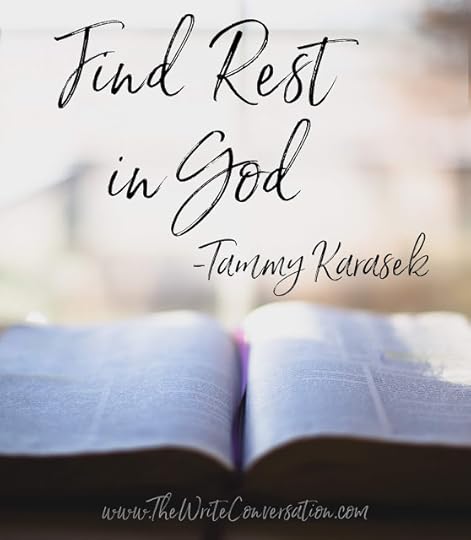
by Tammy Karasek @TickledPinkTam
I wish I could say my soul is perfectly content—that I have the kind of soul-rest that comes from God. Or that I don’t have stress or impatience in my life and I quietly wait as I let God handle everything. But I’m a stubborn only child and often behave like a toddler ready to strike into a full-blown tantrum. I like to do things “by myself.” What the toddler is usually trying to say is I don’t need you, I can handle this on my own. Have you ever felt this way?We are told to take time to rest. Articles from women’s magazines to medical journals shout from the rooftops the benefits of rest. While I will not argue the importance of resting as in sitting down for a period of solitude or even sleep, the rest I’m talking about is a rest that comes from God. “My soul finds rest in God alone;” (Psalm 62:1 NIV)
The kind of rest written in the above scripture is what I seek. What about you?
As I have grown older and wiser, I have learned true rest in my soul can’t be obtained by anyone or anything other than God. No amount of sitting and relaxing in the sand by the ocean or in a rocking chair at a mountain cabin can give me that kind of soulful peace. Oh, most definitely it can slow us down and give us the opportunity to calm down or de-stress, but it cannot give us the kind of rest deep within us. We can get in the way of that.
When we read through Scripture and are quiet with God—it’s there in that time and space where we find that rest. Where we close out the world, turn off the noise and ignore the push for social media numbers. There is where we find sweet rest, deep down in our innermost being.
As I go along on this journey of a writer, it’s more evident that I also need this type of God-rest in every piece I create. I need to have patience for a magazine, editor or agent to take notice of the words I have tapped out on my keyboard. Yes, I need to work through the process of write it, submit what’s required and then move on to the next thing. Ah, move on to the next thing. That’s been an obstacle for me. I’ve gotten good at the write it and submit it (well that part sometimes!) but then I tend to sit and wait. That wasn’t working out for me, probably not for you either if you’ve done the same.
What was missing? Seeking the quiet rest after the submission. To do this, I had to take the time to pray over it as I pressed submit. Next, give the piece to God and take up His soul-filled rest and move on to the next piece. Stop obsessing about it.
I realized I hadn’t asked for the calm, let alone the rest. I’ve ignored my time to sit with God and process the writing pieces at hand. I’ve not read my Bible to meet God in that quiet space to allow him to pour into me that deep rest I’m longing for.
It’s me getting in the way. Not God ignoring me.
My prayer for you today is that you make it a priority to find time to sit with the Lord and seek that rest, deep in your soul, that only He can give you regarding your writing journey. We need to remember He’s the one who gave us this calling and you matter to Him.
TWEETABLEFind Rest in God - encouragement from @TickledPinkTam on @EdieMelson (Click to Tweet)
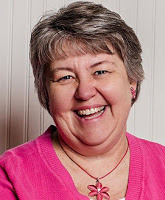 You’ll find Tammy seeing humor and causing laughter in every aspect of life. Her past, filled with bullying and criticism from family, is the driving force of her passion to always encourage others and give them The Reason to smile. She’s been married to her college sweetheart, Larry, for 37 years, a mom to their grown daughter, Kristen, and wrapped around the paw of a little dog named Hattie. Born and raised in Ohio, her family now resides in South Carolina. She is the President of Word Weavers Upstate SC, member of ACFW and My Book Therapy/Novel Academy. She’s the Blog Editor for Word Weavers International. A Conference Assistant for Blue Ridge Christian Writers Conference. A monthly contributor for The Write Conversation. A contributor in the 2018 Divine Moments Compilation Book—Cool-inary Moments. Also a regular contributor to several other blogs.
You’ll find Tammy seeing humor and causing laughter in every aspect of life. Her past, filled with bullying and criticism from family, is the driving force of her passion to always encourage others and give them The Reason to smile. She’s been married to her college sweetheart, Larry, for 37 years, a mom to their grown daughter, Kristen, and wrapped around the paw of a little dog named Hattie. Born and raised in Ohio, her family now resides in South Carolina. She is the President of Word Weavers Upstate SC, member of ACFW and My Book Therapy/Novel Academy. She’s the Blog Editor for Word Weavers International. A Conference Assistant for Blue Ridge Christian Writers Conference. A monthly contributor for The Write Conversation. A contributor in the 2018 Divine Moments Compilation Book—Cool-inary Moments. Also a regular contributor to several other blogs. Connect with Tammy: Blog: http://www.tammykarasek.com Email: tickledpinktammy@gmail.com
Published on September 14, 2019 22:00
September 13, 2019
Are You Speaking Strong Words or Weak Words to Yourself?
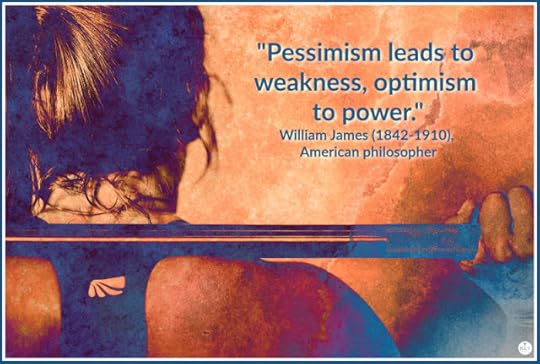
by Beth K. Vogt @BethVogt
My youngest daughter started college a few weeks ago and she’s excited to be playing volleyball at the collegiate level. We were talking about her being on the team, and she shared how the coaches are encouraging them to think strong words about themselves, not weak words. Her coaches are challenging each athlete to pay attention to what they think because their mental strength affects their how perform on the court, both during practices and games.
We are writers. We know the power of words. We deal in words every day.
Used rightly, our words can be woven into poetry or a thought-provoking article or a story that spans the ages and captures our imaginations.
Knowing this, it still surprises me how we can be both careless or reckless with our words, especially when it comes to our own internal dialogue.
We too often say the worst things to ourselves. We think the worst is going to happen … or that other people think the worst about us.
We litter our thoughts with pessimism rather than populating them with the power of optimism.
How do we expect to thrive – much less expect our dreams and careers to thrive – when we suffocate them in weak words? Internal negative self-talk can sound like:I’m never going to finish this manuscript. Why am I even trying?He won an award again and I didn’t even final. This proves – yet again – I’m not a successful writer.I’m so behind this week I’m never going to catch up. Another rejection from an agent. It’s just not gonna’ happen.Every. Single. Word. I. Wrote. Today. Stinks.
We’ve all said things like this to ourselves, either in our heads or out loud. These are weak words—the kind of words that undermine our strength, our ability to be the writers God intends us to be.
My daughter also shared that her coaches want each athlete to choose specific strong words for themselves. The coaches plan to write them down and then speak the words aloud to the players when they’re struggling on the court. She’s taking her favorite Scripture verse and turning it into her strong words. Now that’s using Truth as your strength.
For me, strong words might be something like, “God will bless the works of my hands (Psalm 90:17) and help me reflect Him to the world through my writing (2 Corinthians 3:18). I could even sum that thought up to Bless and Reflect.
What would your strong words be?
TWEETABLEAre You Speaking Strong Words or Weak Words to Yourself? Encouragement from @BethVogt on @EdieMelson (Click to Tweet)
 Award-winning author Beth K. Vogt believes God’s best often waits behind the doors marked “Never.” Having authored nine contemporary romance novels and novellas, Beth's first women's fiction novel with Tyndale House Publishers, Things I Never Told You, released May 2018. Moments We Forget, book two in the Thatcher Sisters Series, releases May 2019. An established magazine writer and former editor of the leadership magazine for MOPS International, Beth blogs for Novel Rocket and The Write Conversation and also enjoys speaking to writers group and mentoring other writers. Visit Beth at bethvogt.com.
Award-winning author Beth K. Vogt believes God’s best often waits behind the doors marked “Never.” Having authored nine contemporary romance novels and novellas, Beth's first women's fiction novel with Tyndale House Publishers, Things I Never Told You, released May 2018. Moments We Forget, book two in the Thatcher Sisters Series, releases May 2019. An established magazine writer and former editor of the leadership magazine for MOPS International, Beth blogs for Novel Rocket and The Write Conversation and also enjoys speaking to writers group and mentoring other writers. Visit Beth at bethvogt.com.
Published on September 13, 2019 22:00
September 12, 2019
Co-Writing with the Holy Spirit
Edie here. Today I'm thrilled to introduce you to our newest regular columnist, Joshua Masters. I've known Josh for several years and I'm so excited he's going to be sharing his heart and his insight with all of us regularly! Give him a warm TWC welcome.

by Joshua Masters @JoshuaJMasters
If the genre we write has the word Christian in front of it, we should approach every project as a collaboration, a partnership where we’re the junior partner.
The best-selling author of all time has invited us to join Him on His latest writing endeavor. No author has had a greater impact on the world or sold more books than the Holy Spirit. He need not include us in His work, but He enjoys mentoring and building a relationship with other writers. It’s a journey of deep relationship and learning as He guides us in the calling He’s given us.So how can we be sure we’re being a good writing partner?
Here are five tips to successfully co-write with the Holy Spirit:
1. Take frequent meetings.
You can’t collaborate with someone unless you communicate with them. What if you were co-writing a novel with someone you never talked with, you just did your own thing and met after a year of solitary writing? Disaster. You’d come back with two very different and incompatible manuscripts. Co-writing with the Holy Spirit requires regular, ongoing communication and fellowship.
It’s a big mistake to say, “Well, I consider my time writing to be my meeting with God.” That’s not timewith God. That’s workingwith God. They’re not the same thing. Yes, we should experience His inspiration while we’re writing. We should feel close to Him as we use the gifts He’s given us, but a true collaboration requires a relationship off the page.
Our best work will come when we regularly meet with our co-writer before raising the cover of our laptop.
2. Research, research, research.
Good writing requires research and good co-writing means devouring everything your partner has written, learning their style, feelings, and beliefs. The same is true when working with the Holy Spirit. When we write Christian material, is it based on our own feelings about a subject or a true understanding of His?
We should spend as much time as possible reading other works by the Holy Spirit, especially that compilation of His sixty-six most popular books.
Whether you’re writing fiction or nonfiction, the best Christian writing does more than give a nod to Jesus in the text—every word must be infused with the Spirit. But that only happens when the human author is infused with the same Spirit. That comes from pursuing a relationship with Him, but it also comes from diligent reading and research.
3. Put the work aside and send it to your co-writer.
Before editing, it’s best to set your work aside for a while. That’s excellent advice for any writer, but it’s even more important for the Christian artist. Aside from giving you distance from the work, this is an opportunity to send your contribution to your co-writer for feedback.
Attach a note (in the form of a prayer) that says, “Dear friend, I’ve been working on our project. Thank you for letting me be a part of it. I’m sending you some pages because I want to make sure we’re moving in the same direction. I will set it aside until I receive your notes. I look forward to hearing from you.”
4. Take edits gracefully.
The difference between co-writing with the Holy Spirit and co-writing with another human being is the level of input we seek to have. Our co-writer wants the piece to reflect our personality, but it must be His message.
We need to edit our split infinitives, but it’s more important to edit our split loyalties. When you return to the work, the Spirit will ask you to strip out anything that comes from a broken world view—anything that doesn’t truly represent Him. He’ll ask you to take out things you think are important.
We want to be a loyal writing partner, but influences from our previous collaboration with sin and the world can creep in. Even if something sounds spiritual, it may come from an unhealthy place of brokenness. God will use our past to encourage others in our writing, but only after He’s rewritten our perspective of those events.
The process of spiritual editing is difficult, but when we humbly accept those notes from our co-writer, the work is greater and He refines our faith.
5. Define Success.
Finally, to have a successful partnership with someone, you must agree on the goals for your project. What does victory look like? Do you and your partner have the same definition of success?
What’s your idea of achievement? Being published in your favorite magazine? Getting on the NYT Best Sellers list?Being number one on Amazon?
That would be amazing. I won’t pretend I wouldn’t love to see those achievements added to my bio, but God’s purpose for your partnership may be very different.
If you listen carefully, the Spirit’s definition of success in your collaboration might just be the first four steps.
TWEETABLESCo-Writing with the Holy Spirit - @JoshuaJMasters on @EdieMelson (Click to Tweet)
5 tips to help us co-write with the Holy Spirit from @JoshuaJMasters on @EdieMelson (Click to Tweet)
 Joshua J. Masters is a pastor, author, and speaker. He’s been featured on CBN Television, HIS Radio, and the Light Radio Network. Josh is the author of American Psalms: Prayers for the Christian Patriot and is a contributing author for Feed Your Soul, Refresh Bible Study Magazine, and One Christian Voice. Josh has also worked as an actor and crew member in the film industry (SAG/AFTRA) and continues to have a passion for film. He lives with his wife, Gina, and Franklin the Pup outside Greenville, South Carolina where he serves as a speaking and care pastor.
Joshua J. Masters is a pastor, author, and speaker. He’s been featured on CBN Television, HIS Radio, and the Light Radio Network. Josh is the author of American Psalms: Prayers for the Christian Patriot and is a contributing author for Feed Your Soul, Refresh Bible Study Magazine, and One Christian Voice. Josh has also worked as an actor and crew member in the film industry (SAG/AFTRA) and continues to have a passion for film. He lives with his wife, Gina, and Franklin the Pup outside Greenville, South Carolina where he serves as a speaking and care pastor.
Josh would love to connect with you on his website, www.joshuajmasters.com or engage with you on Facebook, Twitter, Instagram, or Goodreads.

by Joshua Masters @JoshuaJMasters
If the genre we write has the word Christian in front of it, we should approach every project as a collaboration, a partnership where we’re the junior partner.
The best-selling author of all time has invited us to join Him on His latest writing endeavor. No author has had a greater impact on the world or sold more books than the Holy Spirit. He need not include us in His work, but He enjoys mentoring and building a relationship with other writers. It’s a journey of deep relationship and learning as He guides us in the calling He’s given us.So how can we be sure we’re being a good writing partner?
Here are five tips to successfully co-write with the Holy Spirit:
1. Take frequent meetings.
You can’t collaborate with someone unless you communicate with them. What if you were co-writing a novel with someone you never talked with, you just did your own thing and met after a year of solitary writing? Disaster. You’d come back with two very different and incompatible manuscripts. Co-writing with the Holy Spirit requires regular, ongoing communication and fellowship.
It’s a big mistake to say, “Well, I consider my time writing to be my meeting with God.” That’s not timewith God. That’s workingwith God. They’re not the same thing. Yes, we should experience His inspiration while we’re writing. We should feel close to Him as we use the gifts He’s given us, but a true collaboration requires a relationship off the page.
Our best work will come when we regularly meet with our co-writer before raising the cover of our laptop.
2. Research, research, research.
Good writing requires research and good co-writing means devouring everything your partner has written, learning their style, feelings, and beliefs. The same is true when working with the Holy Spirit. When we write Christian material, is it based on our own feelings about a subject or a true understanding of His?
We should spend as much time as possible reading other works by the Holy Spirit, especially that compilation of His sixty-six most popular books.
Whether you’re writing fiction or nonfiction, the best Christian writing does more than give a nod to Jesus in the text—every word must be infused with the Spirit. But that only happens when the human author is infused with the same Spirit. That comes from pursuing a relationship with Him, but it also comes from diligent reading and research.
3. Put the work aside and send it to your co-writer.
Before editing, it’s best to set your work aside for a while. That’s excellent advice for any writer, but it’s even more important for the Christian artist. Aside from giving you distance from the work, this is an opportunity to send your contribution to your co-writer for feedback.
Attach a note (in the form of a prayer) that says, “Dear friend, I’ve been working on our project. Thank you for letting me be a part of it. I’m sending you some pages because I want to make sure we’re moving in the same direction. I will set it aside until I receive your notes. I look forward to hearing from you.”
4. Take edits gracefully.
The difference between co-writing with the Holy Spirit and co-writing with another human being is the level of input we seek to have. Our co-writer wants the piece to reflect our personality, but it must be His message.
We need to edit our split infinitives, but it’s more important to edit our split loyalties. When you return to the work, the Spirit will ask you to strip out anything that comes from a broken world view—anything that doesn’t truly represent Him. He’ll ask you to take out things you think are important.
We want to be a loyal writing partner, but influences from our previous collaboration with sin and the world can creep in. Even if something sounds spiritual, it may come from an unhealthy place of brokenness. God will use our past to encourage others in our writing, but only after He’s rewritten our perspective of those events.
The process of spiritual editing is difficult, but when we humbly accept those notes from our co-writer, the work is greater and He refines our faith.
5. Define Success.
Finally, to have a successful partnership with someone, you must agree on the goals for your project. What does victory look like? Do you and your partner have the same definition of success?
What’s your idea of achievement? Being published in your favorite magazine? Getting on the NYT Best Sellers list?Being number one on Amazon?
That would be amazing. I won’t pretend I wouldn’t love to see those achievements added to my bio, but God’s purpose for your partnership may be very different.
If you listen carefully, the Spirit’s definition of success in your collaboration might just be the first four steps.
TWEETABLESCo-Writing with the Holy Spirit - @JoshuaJMasters on @EdieMelson (Click to Tweet)
5 tips to help us co-write with the Holy Spirit from @JoshuaJMasters on @EdieMelson (Click to Tweet)
 Joshua J. Masters is a pastor, author, and speaker. He’s been featured on CBN Television, HIS Radio, and the Light Radio Network. Josh is the author of American Psalms: Prayers for the Christian Patriot and is a contributing author for Feed Your Soul, Refresh Bible Study Magazine, and One Christian Voice. Josh has also worked as an actor and crew member in the film industry (SAG/AFTRA) and continues to have a passion for film. He lives with his wife, Gina, and Franklin the Pup outside Greenville, South Carolina where he serves as a speaking and care pastor.
Joshua J. Masters is a pastor, author, and speaker. He’s been featured on CBN Television, HIS Radio, and the Light Radio Network. Josh is the author of American Psalms: Prayers for the Christian Patriot and is a contributing author for Feed Your Soul, Refresh Bible Study Magazine, and One Christian Voice. Josh has also worked as an actor and crew member in the film industry (SAG/AFTRA) and continues to have a passion for film. He lives with his wife, Gina, and Franklin the Pup outside Greenville, South Carolina where he serves as a speaking and care pastor.Josh would love to connect with you on his website, www.joshuajmasters.com or engage with you on Facebook, Twitter, Instagram, or Goodreads.
Published on September 12, 2019 22:00



